Redditor Asks If He'll Be The A-Hole If He Doesn't Want To Walk His Roommate's Dog
Dogs are very hard to resist. All pet lovers would know that.
You see one, and if it is adorable, you want to give it something nice. Plus, because so many dogs are walking angels on Earth, many pet lovers often want what's best for them, even if they aren't their very own dogs.
Some people would even take the time to care for, feed, play with, and walk other people's dogs because they simply want what's best for the dog. Sadly, in many cases, these kinds of people are taken advantage of by pet owners who are lazy or irresponsible.
It starts with one favor, and then once the person grants it, it becomes endless. And, of course, this is unjust, but the person being taken advantage of can also feel guilty for a number of reasons.
For Redditor turbotron3000, that's exactly the case with his situation involving his roommate. At first, he was happy to help out with his roommate's dog, but when his roommate started becoming more reliant on him to walk the dog, OP began to get fed up.
The problem is that OP is also considering many factors in the situation, and he's not really sure if he'll be in the wrong for refusing to walk the dog anymore. Here's the whole story.
OP asks:

OP understands that everyone has busy lives, but when his roommate started becoming more dependent on him for the dog's needs, OP began to get fed up
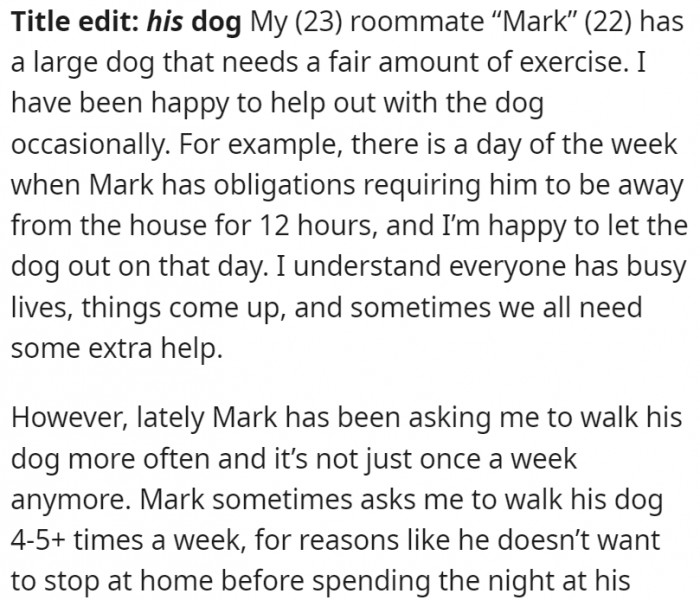
OP would still be happy to help out occasionally, but with limits
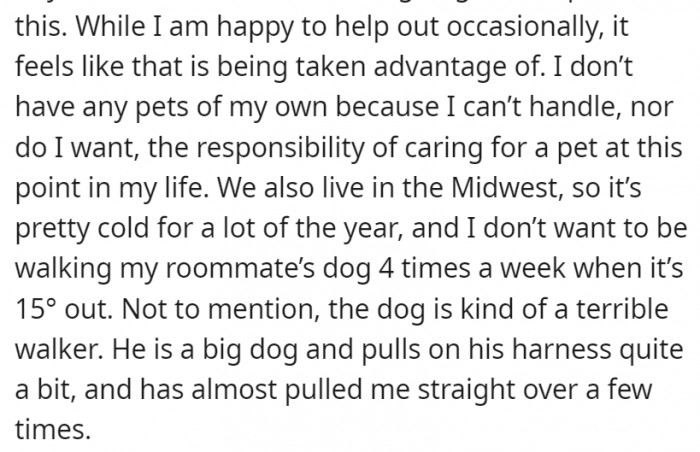
The Dynamics of Shared Responsibilities
Dr. Kevin Taylor, a social psychologist, notes that feeling taken advantage of in shared responsibilities can lead to significant interpersonal conflict.
His research indicates that when individuals feel their contributions are undervalued, it can foster resentment and dissatisfaction.
In this case, the Redditor's reluctance to walk the roommate's dog reflects a broader issue of perceived fairness in shared living situations.
Feeling Taken Advantage Of
This scenario illustrates a common feeling of being taken advantage of, particularly in shared living situations. The Redditor's hesitance to walk his roommate's dog suggests a boundary violation, which can lead to feelings of resentment.
Research in psychology highlights that individuals often experience heightened stress when they feel their personal boundaries are not respected. Setting clear boundaries is essential for maintaining healthy relationships, especially when living with roommates.
OP cares about the dog, though, so he feels bad for saying no
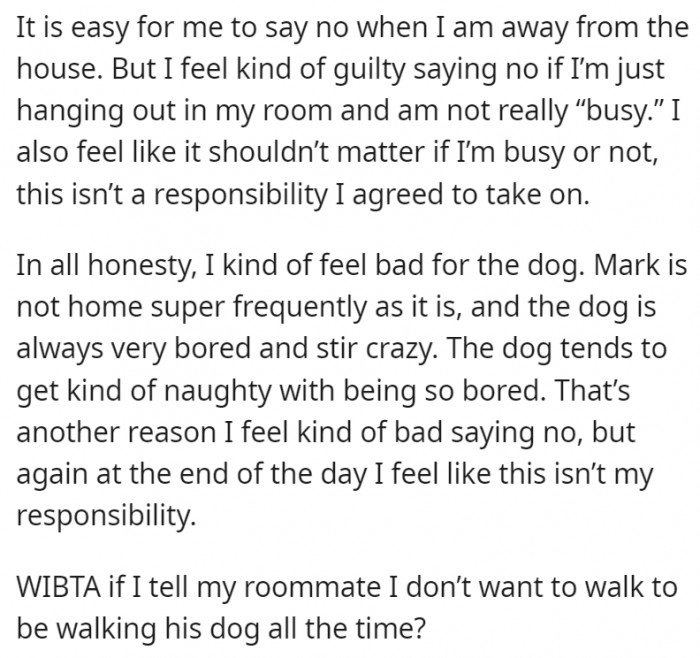
Just because your roommate agreed to a favor for your pet a few times doesn't mean that they agreed to share in the responsibilities of being a pet parent. They weren't the ones who got the dog, and they also didn't sign up for it.
As it seems, though, OP's roommate has become a little complacent with OP's kindness. Many people in the comments section also think so.
Here are some points people made in the comments section.
1. Set proper boundaries that the roommate is well aware of
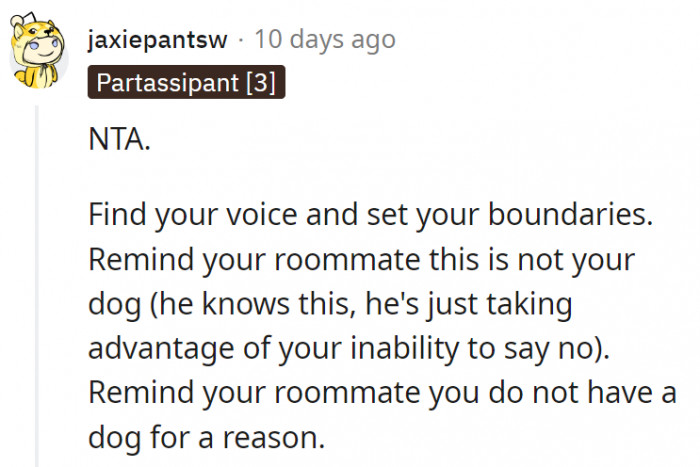
If the roommate still insists, then make him pay for the services
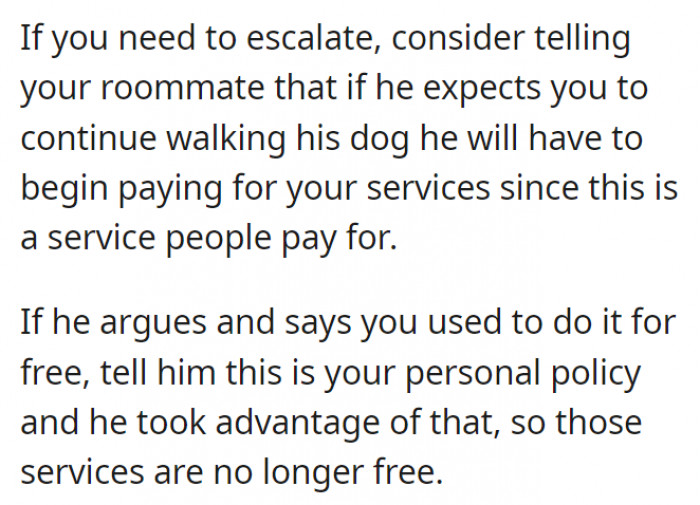
Studies show that establishing clear agreements about shared responsibilities can mitigate conflict in roommate situations.
Research in social dynamics suggests that when expectations are communicated clearly, roommates can work together more effectively, reducing misunderstandings.
This highlights the importance of transparency in shared living arrangements.
Moreover, this situation underscores the importance of mutual expectations in shared living arrangements. As Dr. Michele Gelfand, a cultural psychologist, notes, "When expectations are misaligned, it can lead to conflict and dissatisfaction." Engaging in discussions about responsibilities can help clarify each person's role and reduce misunderstandings, which is crucial for maintaining harmony in shared spaces.
2. The roommate is basically abandoning the dog little by little
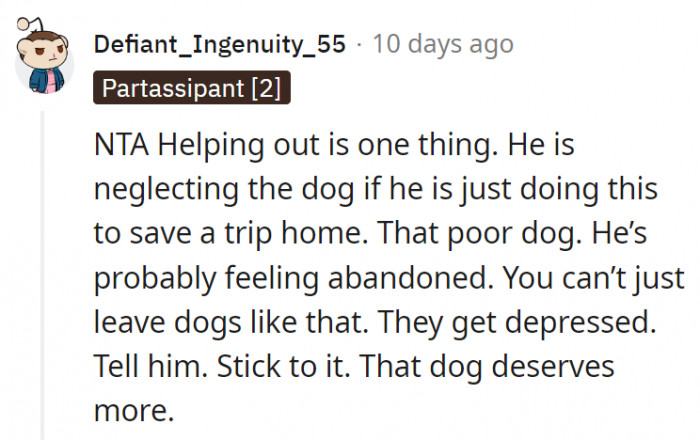
3. The dog is the roommate's responsibility, not OP's
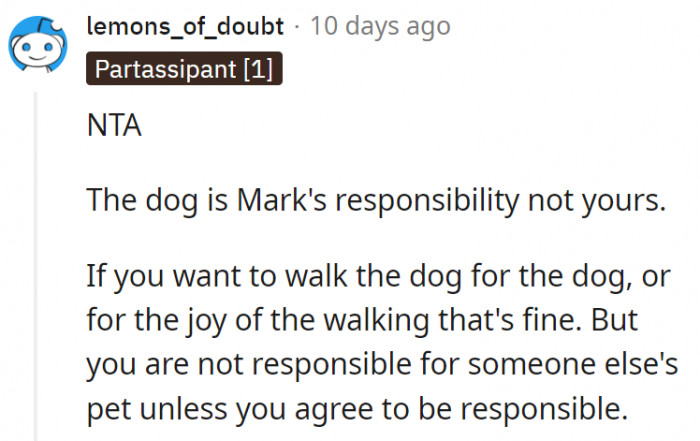
4. Revealing how OP really feels about the situation may help the roommate understand what he's doing
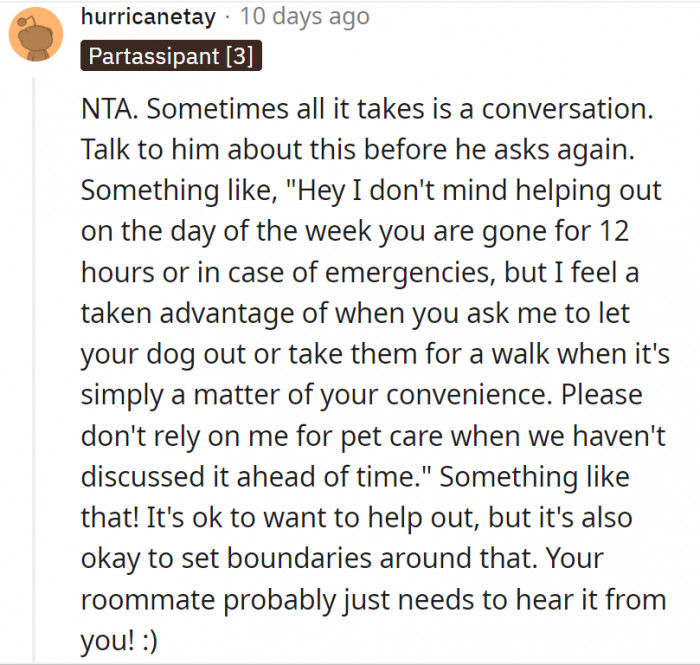
Strategies for Fairness in Shared Living
Experts recommend creating a chore chart or schedule to clarify responsibilities among roommates.
Research indicates that visual aids can help ensure everyone understands their roles, promoting accountability.
Additionally, regular check-ins can be beneficial for discussing any grievances or adjustments needed, fostering a more cooperative living environment.
The Importance of Assertiveness
To navigate feelings of being taken advantage of, practicing assertiveness can be incredibly beneficial. Assertiveness involves expressing one's needs and boundaries clearly and respectfully, which can help prevent resentment from building up in relationships.
Research indicates that individuals who practice assertive communication tend to have better relational outcomes and lower levels of stress.
5. Not your dog, not your responsibility

6. A fair compromise to soothe OP's guilt can be by setting limits on the actions he takes with the dog

7. The roommate desperately needs to step up

Moreover, establishing boundaries around personal space and responsibilities is crucial in shared living situations.
Experts suggest discussing what each person is comfortable with to prevent feelings of being taken advantage of.
By openly communicating expectations and limitations, roommates can foster a more harmonious living arrangement.
Additionally, utilizing 'I' statements can be a powerful tool in expressing needs. For example, saying, 'I feel overwhelmed with my own responsibilities and need to focus on them' can communicate boundaries without placing blame on the roommate.
Practicing these skills can lead to healthier interactions and more balanced relationships.
8. Helping out is okay, but only in times of need and not for convenience

9. Being straightforward may help the roommate finally understand where OP is coming from

10. Boundaries are highly encouraged
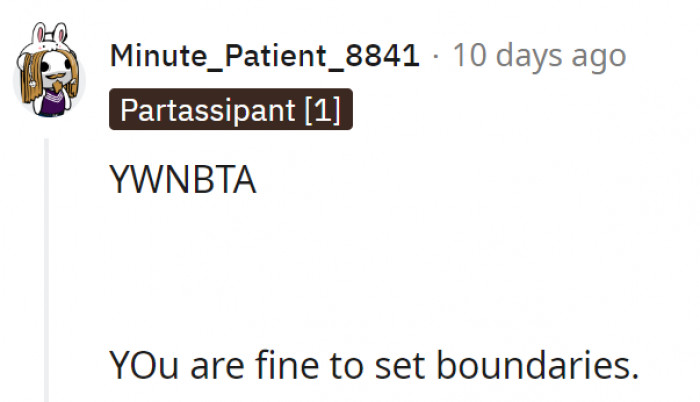
Building Cooperative Living Environments
This situation also emphasizes the importance of cooperation in shared living situations. Establishing a system for shared responsibilities can alleviate feelings of being overwhelmed and promote collaboration. According to Gretchen Rubin, a happiness researcher, "When we share responsibilities and communicate openly, we create a more harmonious living environment." Research supports that creating agreements about responsibilities can lead to higher levels of satisfaction in shared living arrangements, as noted by Dr. Daniel Goleman, an emotional intelligence expert, who states, "Clear communication about roles fosters understanding and reduces conflict."
11. If the roommate continues with this attitude, it might be time to find a new place to live
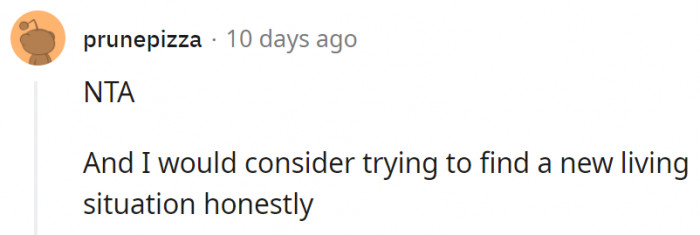
12. At least OP is thinking about the sake of the dog

13. The roommate needs to learn how to be a responsible pet owner
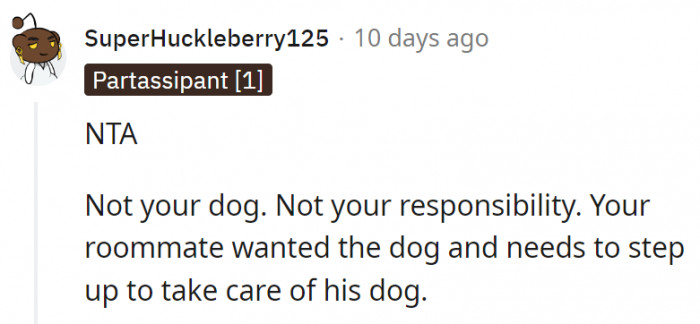
To foster cooperation, roommates can engage in regular check-ins to discuss responsibilities and any feelings of overwhelm. This proactive approach can create an environment where both parties feel valued and respected, ultimately enhancing the living experience.
By working together to establish boundaries and responsibilities, roommates can navigate potential conflicts more effectively.
If we were in OP's position, we'd also feel guilty for the dog's sake. It had already been semi-abandoned by its owner, and doing it all over again would just be cruel.
Hopefully, OP gets to communicate his concerns and thoughts to his roommate, and hopefully, the roommate finally steps up and starts taking care of his dog much better than before.
Would you have kept saying yes?
Psychological Analysis
This situation reflects a common struggle in shared living arrangements, where boundaries can become blurred. It's essential for individuals to express their needs clearly to prevent feelings of resentment from building up.
Encouraging open dialogue about responsibilities can create a more balanced and respectful living environment.
Analysis generated by AI
Analysis & Alternative Approaches
In summary, this scenario highlights the challenges of establishing boundaries in shared living situations. By fostering open communication and practicing assertiveness, individuals can navigate feelings of being taken advantage of more effectively.
Ultimately, creating a cooperative living environment enhances relationships and reduces conflicts.
Analysis & Alternative Approaches
Understanding shared responsibilities can significantly impact roommate dynamics.
As highlighted in social psychology research, clear communication and fairness are essential in preventing conflicts.
By establishing mutual agreements and fostering open dialogues, roommates can create a supportive and respectful living environment.



